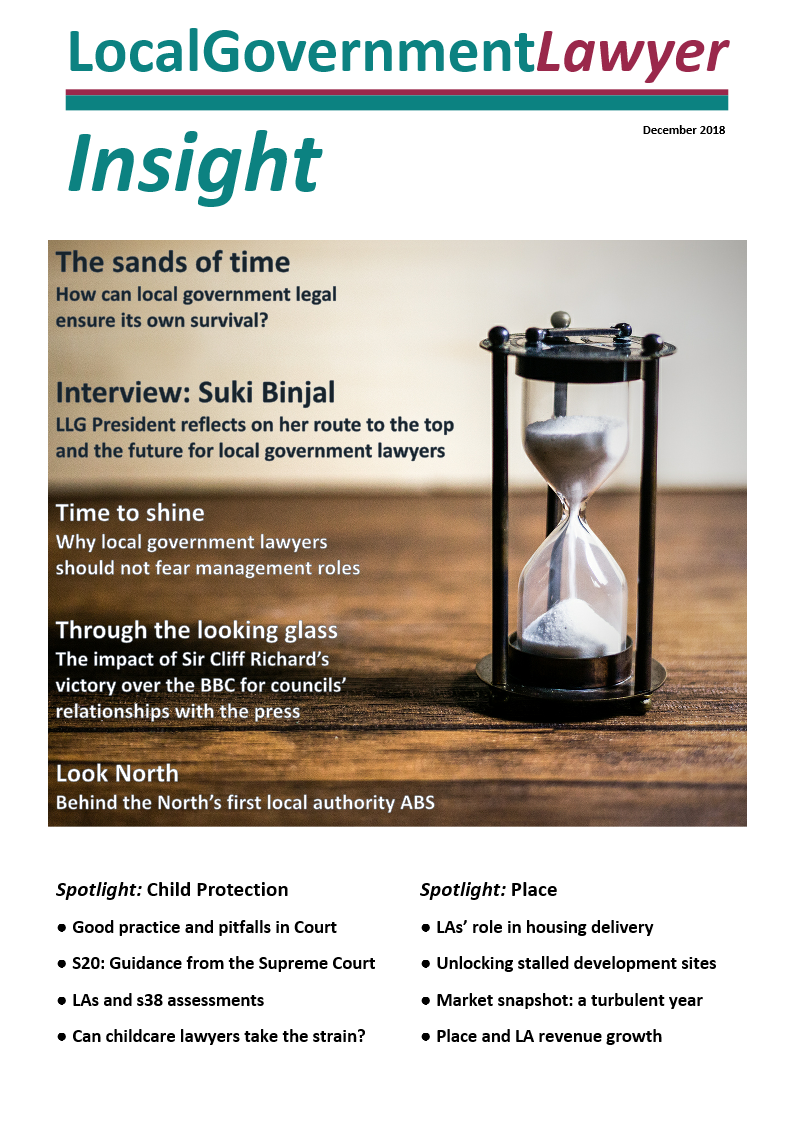s20: Some welcome guidance from the Supreme Court
- Details
Kella Bowers analyses the Supreme Court’s guidance on s20 of the Children Act provided by its decision in Williams v London Borough of Hackney.
 Over the last five years there has been a barrage of cases making their way through the various levels of the court system with regards to the appropriate use, or otherwise, of s20 of the Children Act 1989.
Over the last five years there has been a barrage of cases making their way through the various levels of the court system with regards to the appropriate use, or otherwise, of s20 of the Children Act 1989.
Section 20 allows a local authority to accommodate a child in need who requires accommodation as a result of them being lost or abandoned, where there is no one with parental responsibility to look after them, the person with parental responsibility is unable to care for them or, regardless of whether a person with parental responsibility is available, if the local authority feels that it is necessary to promote and safeguard the welfare of the child.
As you will appreciate, this covers a wide range of scenarios and as such has been used regularly and frequently in situations where it has been both justified and wholly inappropriate. In the latter it has resulted in not only care proceedings but also formal complaints, judicial reviews and Human Rights Act claims.
Questions regarding the nature of consent, the necessity for the local authority to obtain such and indeed the length of time for which s20 should be used without court intervention have troubled the courts and by extension those in social care practice.
Local authorities in England and Wales were noted by the Court to have been involved with over 70,000 children in March 2017, a figure which has been steadily rising for the last nine years.
Of these children, 50,000 are the subject of care orders. Just over 16,000 children were accommodated by the local authority without any court order. As such, the question as to whether those 16,000 are lawfully accommodated and whether their human rights, and those of their parents, are being breached is an issue which will affect local authorities up and down the country.
The Supreme Court judgment in this particular matter is extremely helpful in providing guidance as the Justices have taken the time to analyse numerous past cases and the nuanced circumstances of each. One hopes that this is reflection of Lady Hale’s Presidency of the Supreme Court and bodes well for future judgements providing practical guidance for those tasked with working to statutory duties.

The details of the previous cases assessed by the Court are too lengthy to go into here, but for the sake of clarity they include babies taken away from mothers at birth, retention of a child in local authority care when one or more parents have indicated a desire for the child to be returned, whether a parent can validly consent or whether it is actually required and lack of action in situations where the parents do not object to the accommodation but no constructive planning with regards to the future takes place.
Interestingly the Court accepted that, although s20 does not give the same protections to both child and parent that formal care proceedings would do, rushing unnecessarily into compulsory proceedings where there is scope for partnership working with parents may make reunification of the family unit more difficult rather than less. It was noted that there is nothing in s20 to place a limit on the length of time for which a child may be accommodated without care proceedings being initiated and as such, in theory, a child could remain accommodated under s20 for quite some considerable time. However, a local authority is under a duty to assess the child’s needs a prepare a care plan for them with regards to their long-term upbringing.
This is largely where local authorities have fallen foul in claims for breaches of human rights for children accommodated under s20 without any court intervention and associated Independent Guardian support. In cases where a decision has been made that the child cannot be rehabilitated into the family, but no action is taken to assess long-term plans or formalise that arrangement to ensure that the local authority have parental responsibility and the child’s future is court approved, local authorities should expect criticism.
In this particular case the eight children, including an eight-month-old baby, were removed from the parents by way of a Police Protection Order as a consequence of the condition of their home environment and potential issues of neglect.
The children were then subsequently accommodated under s20 and could not initially be returned due to the parents having a bail condition not to have access to the children whilst police investigations continued. During this period the parents were asked to sign a safeguarding agreement with regards to the children’s continuing accommodation about which it was held that they had capacity to consent and did not object. Later involvement by the parents’ solicitors was eventually held not to be an unequivocal withdrawal of consent but rather an offer of collaboration by the parents to avoid the need to care proceedings and achieve the return of the children, which is what eventually occurred. The appellants’ case was that their article 8 of the ECHR rights had been breached due to the children having remained accommodated unlawfully. The Supreme Court dismissed this argument.
The court commented:
- The best way to ensure real and voluntary delegation of responsibility from parent to local authority is to inform the parents fully of their rights under s20.
- No such consent to delegation is required when a local authority essentially steps into the breach where there is no-one with parental responsibility or such a person is prevented from exercising such, as in cases of abandonment, parental refusal to accommodate or, as in this case being prevented by criminal investigation and bail provisions.
- If a parent with unrestricted parental responsibility rejects, the local authority cannot accommodate and must explore other routes to safeguarding the child.
- Safeguarding agreements were accepted as good practice but they should not give the impression of a fait accompli and that the parents have no right to object or remove the children.
- The objection to s20 or the removal of consent or delegation to the local authority must be unequivocal. An offer to work with the local authority to achieve the return of a child would not amount to a withdrawal of consent or delegation and therefore is not a reason to immediately require the commencement of care proceedings.
- There is no time limit within the Children Act as to the length of time that section 20 can be used. However, a failure to undertake long-term planning, regular assessments and take appropriate action when rehabilitation to the family is abandoned, could lead to criticism and human rights breaches
Williams v London Borough of Hackney is the culmination of a roller coaster of cases which have resulted in those in social care practice being reticent in the use of s20 as a practical tool in their arsenal. One hopes that this case will result in a more sensible and reasonable assessment of its use in the future.
Kella Bowers is Head of the Social Services and Abuse Team at Forbes Solicitors
www.forbessolicitors.co.uk

This article was first published in the December 2018 edition of Local Government Lawyer Insight, which can be accessed at http://www.localgovernmentlawyer.co.uk/insight Insight is published four times a year and is circulated free-of-charge to all Local Government Lawyer newsletter subscribers (click here to subscribe) in electronic format. A single hard copy is also circulated to all local authority legal departments in England and Wales. Also in this issue: Sands of time Interview: Suki Binjal Time to shine Through the looking glass Look North Spotlight: Child Protection
Spotlight: Place
|














































